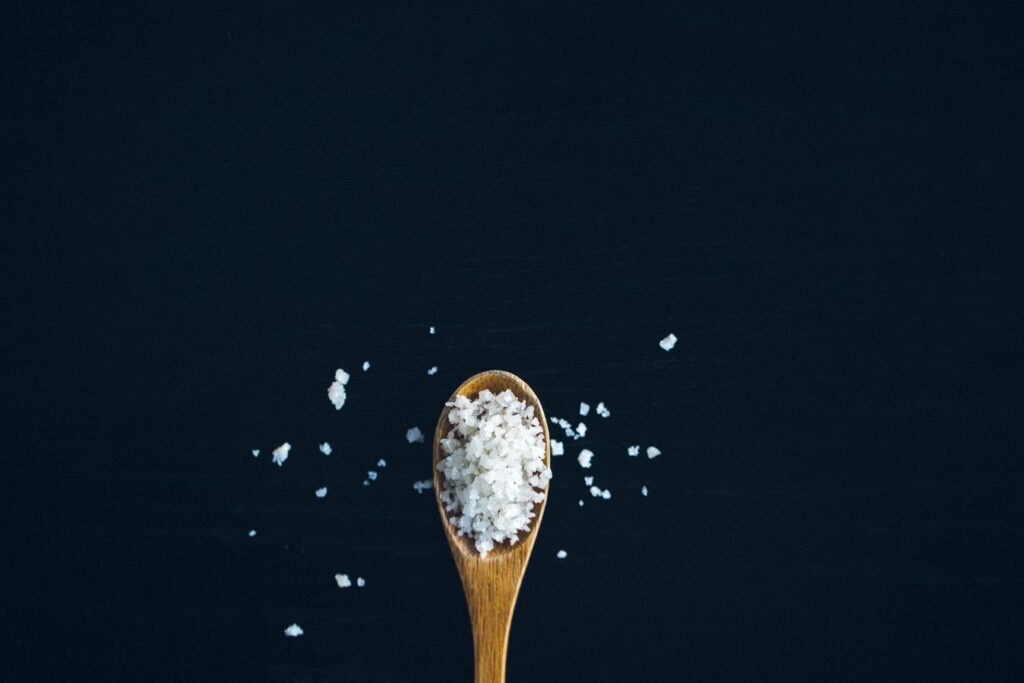This problem is common because many people complain about having a salty mouth. A salty taste in the mouth can occur for a variety of reasons. Typically, there is nothing to worry about. But if additional symptoms accompany it, it’s best to have a complete physical. It may occasionally be a symptom of a hidden medical issue. We’ll look at the causes of everything tasting salty in this article. Please keep reading.
Why Does Everything Taste Salty?
The majority of the time, having a salty taste in your mouth is not a medical emergency, but it is a sign that you shouldn’t disregard. The most common reasons for a salty mouth include:
Dehydration
There is some salt in your saliva (spit) by nature. However, the salt in your saliva gets more concentrated when you are dehydrated. Think of the difference between a sprinkle of salt in a glass of water and the same amount in a teaspoon of water. There isn’t as much water to dilute the salt, so the teaspoon of water will taste saltier.
The consistency of your saliva is altered by dehydration. Drinking enough water each day can frequently help you get rid of the salty taste.
However, hold off on grabbing a huge jug of water if you suffer from a heart or kidney condition. It may be necessary to restrict water intake for those taking diuretics for kidney or heart disease. Ask your doctor how much water you should drink each day if you have any medical conditions.

Dry Mouth
A dry mouth is frequently an indication of dehydration. However, having a dry mouth can occasionally be a symptom of a medical condition. Doctors refer to this as xerostomia. A person with xerostomia might experience cotton ball symptoms. Additionally, their saliva may be dry or sticky and have an odd, bitter, or salty flavor.
Medication side effects and tobacco use are two common causes of xerostomia. Xerostomia is also a symptom of various health conditions, including:
- diabetes mellitus
- stroke
- Alzheimer’s disease
- HIV or AIDS
Blood In The Mouth
Oral bleeding might be the cause of a metallic or salty aftertaste. If you brush your gums vigorously or consume sharp foods like chips, your mouth may bleed.
For continued health, practicing good oral hygiene is crucial. Even if you enjoy regularly brushing and flossing your teeth, gum disease might be to blame if your gums continue to bleed. Gums that are sore and swollen can result from gingivitis.
Effective recovery depends on receiving treatment as soon as possible; otherwise, the gum infection may become more severe. Visit your nearest dentist as soon as possible if your gums are bleeding or tender and you are unsure of the cause.
Oral Infection
Periodontitis, an infection, can develop if gingivitis treatment is postponed, which can worsen the situation. Positive outcomes are possible if the infection is treated promptly. Otherwise, periodontitis can harm your teeth and bones in more severe cases.
When gingivitis progresses to periodontitis, a person may experience the following symptoms:
- foul breath
- gum abscess
- loose teeth
- tooth abscess
Oral thrush, for instance, can spread other infections when there is bleeding in the mouth. This infection may cause painful white patches or a burning sensation inside of your mouth. Others have salty mouths, while some people lose their sense of taste.
Reflux
You might notice a salty or sour taste in your mouth if you’ve ever had acid reflux. Bile reflux is a similar scenario. Symptoms of both acid and bile reflux are similar and can occur separately or concurrently.
When bile from the small intestine leaks into the esophagus and stomach, it is referred to as bile reflux. In contrast, acid reflux occurs when stomach acids flow into the esophagus. Some other symptoms you can experience are:
- coughing
- nausea
- recurrent heartburn
- vomiting bile
- weight loss
- hoarseness
- a painful upper abdomen
Without treatment, gastroesophageal reflux disease (GERD), a serious condition, can result from acid or bile reflux. Making dietary and lifestyle adjustments is a simple way to treat reflux. Reflux can also be treated with certain medications and surgery.
Postnasal Drip
Postnasal drips, which leave you with an unfavorable salty aftertaste, can be caused by allergies and sinus infections. When you’re sick, your throat may become clogged with nasal mucus. You might feel salty when this liquid and the saliva in your mouth combine, which is known as salty phlegm. You might have trouble breathing as a result of the stuffy nose.
Allergies and colds typically improve over time. You should take more rest, consume lots of fluids, and take over-the-counter cold medications, though, if you want things to go more quickly. Blocked nasal passages can also be cleared out with saline rinses or sprays.
Experts recommend heading to your physician if you experience:
- sinus pain
- nasal discharge with blood
- high fever
- symptoms lasting for more than a week
Nutritional Deficiencies
There may be a nutritional deficiency to blame if you frequently wonder why everything tastes salty. A lack of some nutrients can cause your mouth to taste like salt or metal. These nutrients may become scarce suddenly or over a period of years.

You can also expect:
- irregular heartbeat
- paleness
- weakness
- confusion
- behavioral changes
- lost sensation in hands and feet
Hormonal Changes
The fluctuating and ongoing hormonal changes in women are dynamic. Women become particularly sensitive during pregnancy and menopause, which is why symptoms like headache, nausea, vomiting and a salty taste in the mouth are frequently experienced.
The good news is that symptoms lessen after the baby is born and disappear as the pregnancy progresses. For women going through menopause, however, hormone replacement therapy is an option.
Neurological Problems
Sometimes CSF, or cerebrospinal fluid, leaks out of the membranes due to a break or tear, dripping into the mouth and nose and changing the taste too bitter or salty.
Sjögren Syndrome
The immune system of the body attacks the glands that produce moisture when this condition is present. This also affects the tear ducts and salivary glands, leaving the mouth extremely dry and with a salty, unpleasant taste. Other symptoms you may experience are:
- Vaginal dryness
- Joint pain
- Skin rashes
- Dry cough
- Fatigue
In addition to lupus or rheumatoid arthritis, Sjögren syndrome can also occur in conjunction with other autoimmune diseases. Utilizing over-the-counter mouthwashes or drinking water makes treating the symptoms simple.
Medication Side Effects
There are many drugs that can leave you with a salty or metallic taste in your mouth. A dry mouth, which again results in salted saliva, is another potential medication side effect. Ask your doctor for suggestions if you believe your medication is altering the flavor of your mouth.
Treatment Options
Depending on the cause, the right course of action for a salty aftertaste must be taken. Home remedies a person may wish to try include:
- drinking water
- practicing daily oral hygiene
- rinsing with an antibacterial mouthwash
- chewing sugar-free gum
- drinking plenty of water throughout the day
- reducing alcohol or tobacco consumption
- avoiding greasy or spicy foods
When Should You Call A Doctor?
Someone with a salty taste in their mouth should speak with a healthcare professional if:
- the taste does not go away
- they suspect they may have an infection
- they suspect an underlying health condition
If the taste is a side effect of the medication, it might disappear once the person stops taking it. But before stopping any prescribed medication, patients should always consult a doctor.
Conclusion
There are numerous natural cures for the condition of having a salty mouth. A salty taste in the mouth can occasionally be a symptom of a hidden medical issue or a negative drug side effect. If the taste persists or if someone suspects an infection or condition, they should consult a doctor.



